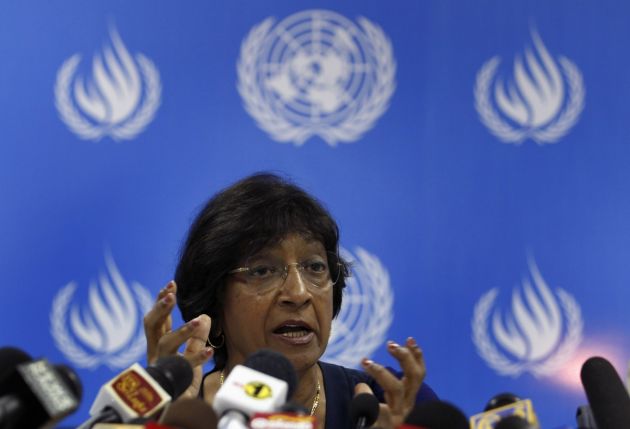Sri Lanka vexed after UN rights chief says it's inciting religious hatred

United Nations High Commissioner for Human Rights Navi Pillay has angered the Sri Lanka government by accusing it of a recent surge in incitement of hatred and violence against religious minorities, including attacks on churches and mosques.
Pillay spoke to journalists on August 31 after a seven-day visit in which she held discussions with President Mahinda Rajapaksa, and senior members of his government.
She visited Sri Lanka to review its progress in investigating of alleged abuses during the decades-long civil war between government forces and separatist LTTE (Tamil Tiger) rebels, supporting an independent Tamil homeland that ended four years ago.
Christians make up around 7 percent of the 22 million people living in Sri Lanka where 74 percent of the people are Sinhalese, most of whom are Buddhists.
Sri Lanka's army defeated the Tamil rebels in 2009 after the brutal 26-year war. During its final phase of that war the actions of government forces came under scrutiny and the government's human rights record since then has been strongly criticised.
The former South African High Court judge, who is of Indian Tamil origin, said that although she was allowed to travel freely during her week-long visit, security forces harassed and intimidate Sri Lankans who came to meet.
PREJUDICED
A top Sri Lanka official Tuesday dismissed Pillay's rebuke of the country's human rights record as "prejudiced."
"We find the tone and substance of her statement very distressing. It displays a total lack of balance and indicative of prejudice. She has chosen to look at the Sri Lankan situation through jaundiced eyes, which we find objectionable," G. L. Peiris, Sri Lankan Foreign Minister told journalists.
"Some media, ministers, bloggers and various propagandists in Sri Lanka have, for several years now, on the basis of my Indian Tamil heritage, described me as a tool of the LTTE. They have claimed I was in their pay, the 'Tamil Tigress in the UN.' This is not only wildly incorrect, it is deeply offensive. This type of abuse has reached an extraordinary crescendo during this past week, with at least three Government Ministers joining in.
"Firstly, let me say, I am a South African and proud of it."
"I expressed concern at the recent surge in incitement of hatred and violence against religious minorities, including attacks on churches and mosques, and the lack of swift action against the perpetrators," said Pillay in her remarks.
"I was surprised that the government seemed to downplay this issue, and I hope it will send the strongest possible signal of zero tolerance for such acts and ensure that those responsible (who are easily identifiable on video footage) are punished."
In her remarks in Colombo, Pillay said referred to, "a disturbing aspect of the visit, namely the harassment and intimidation of a number of human rights defenders, at least two priests, journalists, and many ordinary citizens who met with me, or planned to meet with me.
"I have received reports that people in villages and settlements in the Mullaitivu area were visited by police or military officers both before and after I arrived there in Trincomalee, several people I met were subsequently questioned about the content of our conversation. "
She said such "surveillance and harassment appears to be getting worse in Sri Lanka, which is a country where critical voices are quite often attacked or even permanently silenced."
A Catholic-run human rights group that operates in northeastern Sri Lanka said security personnel had harassed its members working in northeastern Sri Lanka after meeting Pillay last week.
JESUIT PRIEST
The 60-year old Jesuit priest who runs the Center for Promotion and Protection of Human Rights, Rev. Veerasan Yogeswaran, said five or six plainclothes policemen visited him at midnight and before dawn, just hours after the meeting with Pillay.
"The concern is that they are going to homes at midnight and questioning people," the priest told Agence France-Presse from his home in Trincomalee, 260 kilometres (160 miles) northeast of the capital Colombo.
"This should not happen four years after the war has ended. People feel harassed and intimidated."
"Just imagine the plight of the ordinary people when they are visited at midnight by the security forces."